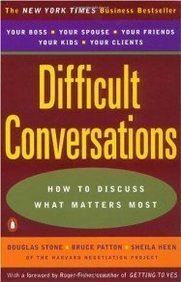Difficult Conversations Book Summary
How to Discuss What Matters Most
TL;DR
Difficult Conversations provides a structured approach to effectively navigate challenging dialogues, focusing on communication strategies that enhance understanding and reduce stress in high-stakes discussions.
What is Difficult Conversations about
Difficult Conversations: How to Discuss What Matters Most, authored by Douglas Stone, Bruce Patton, and Sheila Heen, offers an insightful framework based on extensive research from the Harvard Negotiation Project. The book addresses the universal challenge of engaging in tough conversations, whether they involve performance issues at work, personal disagreements, or sensitive topics in relationships. Through a step-by-step guide, the authors explore the underlying dynamics of challenging discussions, providing readers with practical tools to initiate, conduct, and conclude these conversations with confidence and clarity. The authors emphasize the significance of what remains unsaid as much as what is spoken, fostering an understanding of emotional and psychological contexts during discourse.
Difficult Conversations 8 Key Takeaways
Understanding the three layers of conversation
The authors explain that every difficult conversation consists of three components: the 'What Happened' conversation, the 'Feelings' conversation, and the 'Identity' conversation. Recognizing these layers helps participants to address the root of the conflict and communicate more effectively.
The importance of staying curious
Staying curious during a difficult conversation can defuse tension and enhance understanding. The authors encourage asking open-ended questions and seeking to understand the other person’s perspective instead of focusing solely on defending one's position.
Navigating defensiveness
Defensiveness can derail conversations; the authors suggest techniques for managing this, such as acknowledging your contributions to the situation and shifting the focus from blame to problem-solving.
Developing emotional awareness
The book highlights the significance of recognizing and addressing emotions—both your own and those of the other party. By validating feelings, you can create an environment conducive to openness and resolution.
The '4 D's' of difficult conversations
The authors introduce the framework of Discover, Define, Discuss, and Decide as a method to approach difficult conversations systematically, ensuring that all aspects of the issues are thoroughly explored.
Communicate with clarity and confidence
Effective communication is key to managing difficult conversations. The authors stress the need to articulate thoughts clearly while remaining composed, which can lead to more productive outcomes.
Redefining failure and success
The authors argue that the outcome of a difficult conversation should not solely be defined by agreement but by the quality of the dialogue. This perspective encourages a focus on understanding rather than merely winning an argument.
Building a culture of dialogue
Creating an environment where difficult conversations can occur without fear of retribution is vital. The authors advocate for fostering openness and trust in both personal and professional relationships.
Top Difficult Conversations Quotes
- "The most important thing in a difficult conversation is to remember that it's not about being right, but about understanding each other."
- "Every difficult conversation is a three-part conversation: the 'What Happened' conversation, the 'Feelings' conversation, and the 'Identity' conversation."
- "Curiosity is the key to understanding and resolving conflicts effectively."
Who should read Difficult Conversations?
This book is ideal for anyone seeking to enhance their communication skills, from professionals in leadership roles to individuals facing personal challenges. Readers will gain valuable insights on navigating tough discussions, leading to improved relationships and more successful outcomes.
Difficult Conversations Best Reviews
- "This book is a game-changer for anyone who struggles with difficult conversations. It provides practical tools that can be applied immediately." - Harvard Business Review
- "A must-read for leaders and teams looking to improve their communication skills. Stone, Patton, and Heen offer insights that are both profound and actionable." - Forbes
- "Difficult Conversations is not just about talking; it's about understanding and navigating human emotions—essential reading for anyone wanting to improve their interpersonal skills." - The New York Times


